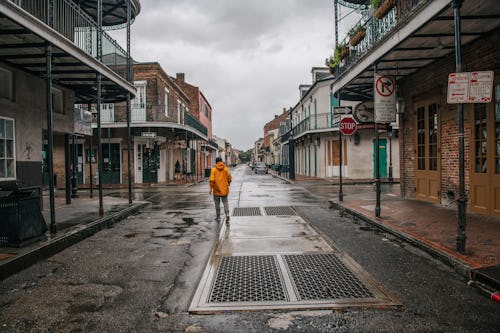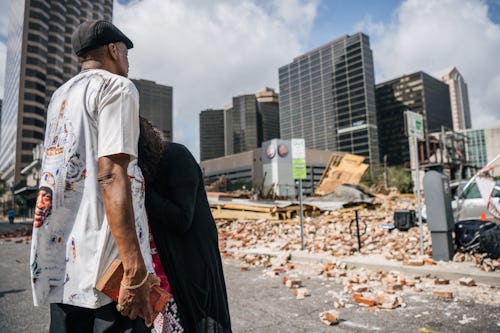
In the wake of Hurricane Ida, millions of people in New Orleans are without electricity and safe drinking water. Those of us who were lucky enough to evacuate before the storm are being told we can’t come home because the streets and the city aren’t safe yet. To make matters worse, for people stuck in the city and residents displaced by the storm alike, it’s hard to know where to go for help.
Most people tend to assume that when natural disasters strike, the government or giant nonprofits swoop in to save people but from what I’ve seen as a resident, it’s New Orleanians themselves — mutual aid volunteers as well as concerned individuals with the bandwidth to help — who do the heavy lifting. For the record, there are so many amazing groups and individual residents hell bent on helping our community recover, but well, they're extremely busy right now. A few of them took a break from their current grind to talk to me about how they've been able to help.
Klie Kliebert, co-founder of Imagine Waterworks, a Louisiana-based climate justice and disaster relief organization, has built their two-person operation, which is funded by donations and is currently operating out of Baton Rouge, into a mutual aid response network of over 6,000 people. “We’ve collaborated with friends to send $15,000 out in emergency cash to folks who need gas, hotels, and supplies like water,” they tell me.
Imagine is currently redistributing dollars in this precarious moment, but Kliebert says they are also thinking about the future. As a Louisiana native, Kliebert knows that recovery is not one and done. “We are collecting funds for relief, recovery, and preparation for the rest of the season,” says Kliebert. “It’s scary for folks to talk or think about, but we still have a couple months of the season.” Kliebert tells me that they are planning out how to distribute resources to folks for the next several months.
The fact that disaster relief should come with a human — and humane — touch should be obvious, but it’s not. As a person who is personally unable to meet my own basic needs right now without assistance, I can’t express to you how dehumanizing it is. Small organizations like Imagine understand this. “Disaster prep and relief work can be informed, factual, shame-free, and human all at once,” says Kliebert. “We’re a big family here in the city, and we always want that to show through our work.”

The family that is New Orleans is coming together, person-by-person, to lift each other up. Some residents don’t have a large network or any resources of their own, but they’re stepping up to help anyways. “There are so many people that needed help before Ida that are in such a desperate place now,” says Claire Holiday Mangano, a 30-year-old who lives in the Mid-City area of New Orleans, which suffered less damage than other parts of the city but still has no electricity. “It’s really overwhelming. I feel like I’ll never be able to do enough.” Mangano tells me that even though she feels helpless, she knew she had to help the people she sees suffering around her.
Because Mangano had stayed in the city with her two dogs, evacuees reached out to her to ask for help. She’s spent the week going to people’s homes and reporting any damage to them. She has also been providing the priceless service of cleaning out refrigerators. It may seem like NBD, but just take a moment to imagine how it might feel to come home to a fridge full of rotting food after two weeks without power. At that point, it's not just gross — it's a health hazard.
“I saw an opportunity to redistribute goods to big groups of houseless people who are incredibly vulnerable,’ Mangano explains. So all that food from peoples’ fridges that could have gone bad instead went into the hands of people who are hungry. This small bit of genius is exactly what I expect from the people of New Orleans, and Mangano’s reason for doing it is also quintessentially New Orleanian. “I hate to say I was inspired because to me that makes it sound optional,” Mangano explains. “It’s my duty.”
There are other altruistic individuals out there helping displaced people, too. Emley Kerry, a 34-year-old fitness instructor in New Orleans, has also been cleaning fridges and checking on people’s cats. Kerry didn’t evacuate because she was sick. Once she started feeling better, she knew she needed to help. “There's been relatively little damage in the homes I've been to,” Kerry says. “I'm really happy to give them the news that their homes are safe and to provide them with some sense of relief.” Plus, Kerry’s getting a lot of head butts from grateful cats, she tells me.
If you want to know how you can help New Orleans right now, stop investing in the nonprofit industrial complex and start Venmo-ing the individuals and small mutual aids who’ve actually got boots on the ground and love in their hearts.







